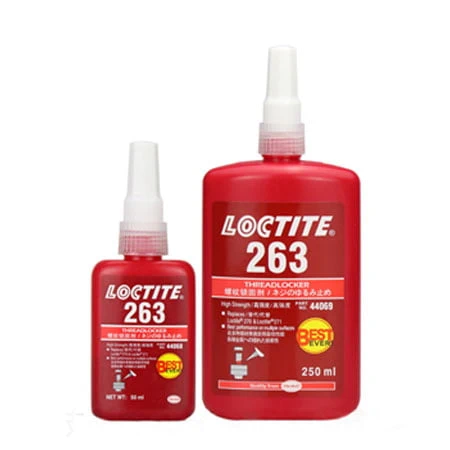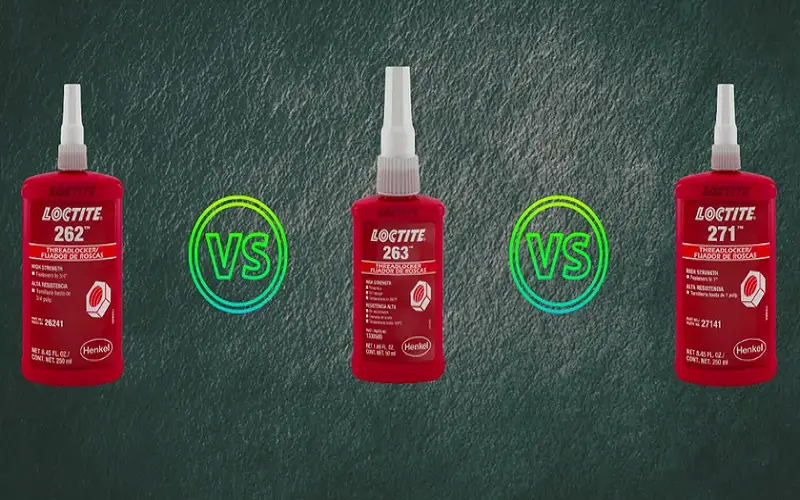Loctite 262, 263, and 271 are high-strength threadlockers used in different applications. Loctite offers a range of threadlockers designed to provide superior strength and reliability in various applications.
Among its popular products, Loctite 262, 263, and 271 stand out for their high-strength capabilities. These threadlockers are formulated to prevent loosening, leakage, or corrosion in threaded assemblies.
Loctite 262 is ideal for securing fasteners up to ¾ inch in diameter, Loctite 263 is designed for larger diameter fasteners up to 1 inch, while Loctite 271 provides maximum strength for fasteners of any size.
Understanding the differences between these threadlockers is crucial to choosing the right one for your specific needs. We will dive deeper into the characteristics and applications of Loctite 262, 263, and 271.
Contents
Loctite 262 Vs Loctite 263 Vs Loctite 271
Purpose
Loctite 262, 263, and 271 are high-strength threadlockers designed for use in various industrial applications.
Each variant is engineered to serve specific purposes, and understanding their differences in applications, strength, and durability is crucial for selecting the most suitable adhesive for your needs.
Differences In Applications
Loctite 262: Ideal for securing fasteners that require easy disassembly with standard hand tools.
Loctite 263: Specifically formulated for locking and sealing fasteners that require disassembly with hand tools, offering enhanced temperature and solvent resistance compared to Loctite 262.
Loctite 271: Designed to lock and seal large bolts and studs, this high-strength adhesive is suitable for applications requiring robust resistance against vibration and extreme conditions.
Strength And Durability Comparison
Loctite 262: Offers medium strength and robust performance, providing secure fastening and sealing for a wide range of applications.
Loctite 263: Provides a higher strength than Loctite 262, along with improved temperature and solvent resistance, ensuring reliable fastening in demanding conditions.
Loctite 271: Delivers the highest strength and durability among the three variants, making it suitable for heavy-duty applications where maximum reliability and resistance to extreme environments are essential.

Chemical Composition
Understanding the chemical composition of Loctite 262, 263, and 271 is crucial in choosing the right adhesive for your application. Each formulation is tailored to deliver specific properties, making it vital to grasp their compositions and how they differ.
Loctite 262
Loctite 262 is designed with a methacrylate ester base, offering exceptional resistance to vibration and impact. Its chemical composition includes dimethacrylate ester, acrylic acid, and hydroquinone, providing high-strength bonding and excellent performance in heavy-duty applications.
Loctite 263
Loctite 263, on the other hand, is formulated with a substantial concentration of methacrylate components. Its chemical composition comprises dimethacrylate ester, hydroquinone, and acrylic acid, enabling it to deliver superior strength and resilience in environments susceptible to high temperatures and harsh conditions.
Loctite 271
Loctite 271 is renowned for its anaerobic adhesive properties. Its chemical composition includes dimethacrylate ester, hydroquinone, and polymer with n-isopropyl acrylamide, ensuring exceptional thread-locking capabilities and resistance to vibration-induced loosening.
Curing Time
Both Loctite 262, 263, and 271 curing times are essential in different applications. Each formula has distinct curing times that suit various requirements. Loctite 262 offers a fast cure time, while Loctite 263 provides a medium cure, and 271 has a slow cure, catering to a range of needs.
When comparing Loctite 262, 263, and 271, curing time is a crucial aspect to consider. The speed at which these adhesives cure can impact project timelines and effectiveness.
Loctite 262
Loctite 262 offers a medium curing time, typically setting in 10 to 20 minutes. This makes it ideal for applications where a balance between workability and efficiency is needed.
Loctite 263
Loctite 263 provides a faster curing time compared to Loctite 262, usually curing in 5 to 10 minutes. This quick setting time can expedite production processes and increase productivity.
Loctite 271
Loctite 271 boasts the fastest curing time of the three, often solidifying within 3 to 5 minutes. This rapid curing makes it a go-to choice for projects requiring immediate strength and durability.
Temperature Resistance
When it comes to high-temperature applications, it is crucial to choose the right adhesive that can withstand the heat. Loctite, a trusted brand in the field of adhesives, offers several options that provide exceptional temperature resistance.
In this post, we will explore the temperature resistance capabilities of three popular Loctite products: Loctite 262, Loctite 263, and Loctite 271.
Loctite 262:
Loctite 262 is a high-strength threadlocker designed for securing and sealing threaded fasteners. It boasts excellent temperature resistance, making it suitable for use in applications where high heat is a concern.
This anaerobic adhesive can withstand temperatures as high as 360°F (182°C) without losing its effectiveness. Whether you’re working on automotive engines, heavy machinery, or other high-temperature applications, Loctite 262 provides the durability and reliability you need.
Loctite 263:
When it comes to high-temperature resistance, Loctite 263 is another great option to consider. This red, high-strength threadlocker has a higher temperature resistance compared to Loctite 262.
It can withstand temperatures up to 482°F (250°C), making it ideal for applications subjected to extreme heat. Whether you’re working on boilers, ovens, or exhaust systems, Loctite 263 ensures that your threaded fasteners stay securely in place, even in the harshest conditions.
Loctite 271:
Loctite 271 is a versatile threadlocker that excels in both high-temperature and heavy-duty applications. With a temperature resistance of up to 600°F (316°C), it can handle extreme heat without compromising its holding power.
This adhesive is perfect for applications such as turbines, power plants, and industrial equipment where temperatures can soar. Additionally, Loctite 271 provides exceptional resistance to oils, chemicals, and vibration, ensuring a secure and long-lasting bond.
Choosing the right adhesive for high-temperature applications is crucial to maintain the integrity and safety of your projects. Whether you opt for Loctite 262, Loctite 263, or Loctite 271, you can be confident that you’re using a reliable solution that can withstand the heat.
Application Industries
Loctite offers a range of powerful adhesives designed to meet the demanding needs of various application industries. Whether you are working on automotive repairs, manufacturing equipment, or even consumer electronics, Loctite has a solution for you.
In this section, we will explore the application industries of three popular Loctite products: Loctite 262, Loctite 263, and Loctite 271.
Loctite 262
Loctite 262 is a high-strength threadlocker adhesive that is commonly used in industries such as automotive, aerospace, and heavy equipment manufacturing.
Its exceptional holding power and resistance to vibrations make it an ideal choice for applications that require reliable and long-lasting fasteners.
The key industries where Loctite 262 finds extensive usage are:
- Automotive: Loctite 262 is widely used in the automotive industry for locking and sealing bolts, studs, and nuts in critical components such as cylinder head bolts, engine mounts, and transmission housing.
- Aerospace: In the aerospace industry, Loctite 262 is a go-to adhesive for securing fasteners in aircraft engines, landing gears, and structural components. Its ability to withstand extreme temperature and stress conditions makes it a preferred choice.
- Heavy Equipment Manufacturing: Loctite 262 is trusted by heavy equipment manufacturers for securing bolts and studs in machinery that operates in rugged environments, such as mining equipment, construction machinery, and agricultural implements.
Loctite 263
Loctite 263 is a high-strength threadlocker adhesive specifically designed for applications where disassembly is required.
It offers excellent performance in industries that demand a balance between strong adhesion and easy removal.
The key industries where Loctite 263 excels are:
- Maintenance and Repair: Loctite 263 is widely used in maintenance and repair applications, allowing for easy disassembly of threaded fasteners without compromising strength. It is commonly employed in machinery repair, equipment overhaul, and general maintenance tasks.
- Metal Fabrication: In metal fabrication industries such as sheet metal assembly, welding, and machining, Loctite 263 ensures that threaded connections remain secure during the manufacturing process. It enables quick and convenient disassembly when required.
- Transportation: Loctite 263 is also prevalent in the transportation industry, where it is applied to critical components such as chassis systems, engine mounts, and suspension components. Its ability to provide strong thread locking while allowing for future disassembly proves vital in maintenance and repair scenarios.
Loctite 271
Loctite 271 is an adhesive designed for applications that demand extreme resistance to vibration and shock.
It is commonly used in heavy-duty equipment, power plants, and other industries that require fasteners to remain securely in place under heavy stress.
The industries where Loctite 271 is widely used include:
- Power Generation: Loctite 271 is highly suitable for power plants, where it ensures the reliability of threaded connections in turbines, generators, and other equipment subjected to constant vibration and high temperatures.
- Oil and Gas: In the oil and gas industry, Loctite 271 is preferred for securing bolts and studs in critical equipment such as pumps, compressors, and pipelines. It withstands harsh environmental conditions and provides long-lasting thread locking.
- Industrial Machinery: Loctite 271 finds applications in heavy machinery manufacturing industries, providing exceptional resistance to vibration and tampering. It is often used in engines, transmissions, gearboxes, and other components that require secure fastening.

User Reviews And Recommendations
Wondering which Loctite adhesive to use? Let’s delve into user reviews and recommendations for Loctite 262, Loctite 263, and Loctite 271 to make an informed decision.
Loctite 262
- Offers impeccable bonding for fasteners and cylindrical parts.
- Users praise its high strength and durability.
- Commonly used in industries like automotive and machinery.
Loctite 263
- Known for its exceptional vibration resistance properties.
- Users recommend it for securing nuts and bolts.
- Dries quickly, making it ideal for rapid assembly applications.
Loctite 271
- Highly revered for its outstanding thread-locking capabilities.
- Offers excellent chemical and temperature resistance.
- Users highlight its ease of use and long-lasting adhesion.
Frequently Asked Questions For Loctite 262 Vs 263 Vs 271
What Is The Difference Between Loctite 262 And Loctite 263?
Loctite 262 is for securing nuts, bolts, and studs, while Loctite 263 is for higher strength needs.
What Is Loctite 263 Used For?
Loctite 263 is used to bond cylindrical parts, providing high strength and temperature resistance.
What Are The Uses For Loctite 262?
Loctite 262 is used for securing and sealing nuts, bolts, and studs. It prevents loosening and leakage, ensuring a strong, reliable bond for heavy-duty applications.
Its high-strength formula is ideal for machinery, equipment, and automotive repairs, providing durable and long-lasting results.
What Is Similar To Loctite 262?
Loctite 262 has a similar adhesive alternative known as Permatex High Strength Threadlocker. This product is specifically designed to provide strong hold for threaded assemblies, just like Loctite 262.
Conclusion
Ultimately, choosing between Loctite 262, 263, or 271 depends on your specific needs. Each formula offers unique benefits, so consider factors like strength requirements and environmental conditions.
By understanding the differences, you can confidently select the ideal product for your project. Make an informed choice for optimal results.

